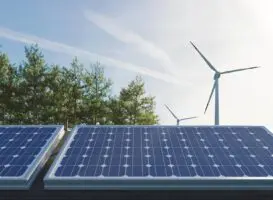Adelaide-based sustainable agriculture outfit Sundrop Farms has secured a lucrative funding partnership with global investment firm Kohlberg Kravis Roberts (KKR), to help grow its innovative solar thermal powered, arid-zone greenhouse projects.
Relying, until now, on funding from the Clean Energy Finance Corporation, Sundrop Farms has developed a prototype of its unique closed-loop farming system in South Australia’s Port Augusta, which uses solar thermal technology to power and heat/cool greenhouses, as well as to desalinate pumped seawater, which is then used to irrigate crops of tomatoes.
The $100 million of funding from leading global private equity investor KKR will allow Sundrop to proceed with plans to expand its Port Augusta prototype into a 20-hectare facility, that will produce over 15,000 tonnes of pesticide-free tomatoes annually for markets across Australia.
As part of the expansion, Sundrop has also signed of a 10-year contract with supermarket giant Coles to buy its tomatoes. And according to Fairfax, another $6 million in funding is being tipped to come from the South Australian government to go towards the project.
In a statement released on Wednesday, Sundrop Farms CEO Philipp Saumweber said that securing the KKR deal would not have been possible without the support of the CEFC.
“The CEFC underwrote a debt package for the project which helped Sundrop Farms secure a debt package with major Australian commercial lenders,” Saumweber said.
“Upon this foundation, we then entered into a partnership with global investment firm KKR, which allowed us to proceed with our state-of-the-art glasshouse in Port Augusta.”
CEFC Oliver Yates said the Sundrop project demonstrated perfectly the role and expertise the CEFC was bringing to develop finance in the Australian clean energy market.
“This shows just how we are helping draw in private sources of funding to enable innovative projects to proceed, generating new economic activity and employment in regional areas,” Yates said.
Indeed, thanks to political instability – and the kind of near-sightedness that would have the Abbott government scheming to scrap the CEFC – private funding is about as scarce in the Australian renewables market as rainwater is in the areas where Sundrop plans to build its solar-thermal greenhouses.
According to a new report, the political impasse over the RET, alone, is costing the renewables sector hundreds of millions of dollars a year in lost investment.
In a paper released on Wednesday, the Clean Energy Council says the breakdown of bipartisanship on the Renewable Energy Target as a result of the Abbott government’s ongoing review is stripping existing investments in the sector of between $400 and $500 million a year.
The CEC analysis also warns that ongoing uncertainty will cause more than $400 million of damage every year to renewable energy projects already in operation – as part of the over $10 billion worth of investment in large-scale projects successfully delivered by the RET, to date.
“These investments were made in good faith based on the bipartisan support for the legislated target continuing to 2030,” Thornton said in a statement.
“A breakdown in that bipartisanship has had a material impact on the market confidence in the policy and is affecting the revenue that flows to those projects.”
But according to a survey of major banks by PwC – also released on Wedesday – the damage could already be done.
The survey found banks were unlikely to provide finance to new wind farms and large-scale solar plants even if the impasse between the government and Labor was resolved.
According to a report by PwC, weak wholesale prices for electricity and policy uncertainty posed “material challenges to new investment in renewable generation and the delivery of the RET by 2020.”
Still, the CEC is urging Labor to go back to the negotiating table on a RET deal.
And its briefing paper, “Lost opportunity and big costs: The impact of an unresolved RET review,” outlines the consequences if a bipartisan deal cannot be reached on the future of the policy.
“We are staring down the barrel of job losses, business closures, negative financial effects on the $10 billion of renewable energy projects already operating, and a halt in the development of new large-scale renewable energy projects across the country,” he said.
“This comes at the same time as an international resurgence in renewable energy, as many of our major trading partners move aggressively towards cleaner sources of power.
“It is understandably a very nervous time for the 21,000 Australians directly employed by this industry. If we can’t get this resolved by Christmas many of these hard-working people will be wondering whether they will have a job in the new year.”
Investment in new large-scale renewable energy in Australia was approximately $2 billion in 2013, but has fallen to just $238 million for the first three quarters of 2014.








